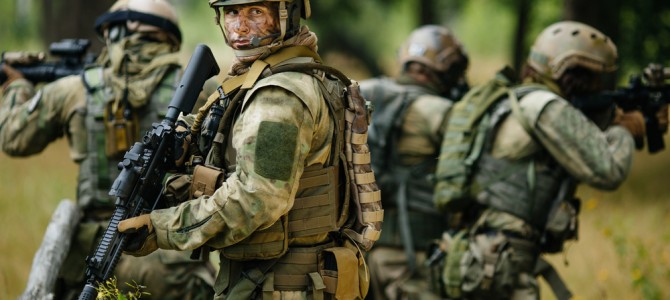
Last month, for the first time since 2010, the Obama administration issued a National Security Strategy. It’s the first time ever that such a document has identified transgenderism as relevant to our vital national security interests. In it, the administration pledges to champion LGBT equality as a core value in America, and promote this value abroad.
Two passages stand out. The first is on page 20:“We will be a champion for communities that are too frequently vulnerable to violence, abuse, and neglect—such as ethnic and religious minorities; people with disabilities; Lesbian, Gay, Bisexual, and Transgender (LGBT) individuals; displaced persons; and migrant workers.”
Women, by the way, are covered in a whole paragraph following this excerpt. But the passage above is interesting not just for its selection of communities the National Security Strategy highlights, but for those demographics it entirely omits. The elderly and children, for example, are extremely vulnerable to abuse and violence. Unlike the small fraction of 1 percent who identify as transgender, the aged and children are sizable and vulnerable minorities, but they are neglected in this National Security Strategy.
So what gives? In the broader context of Obama’s sex and gender politics, transgender issues seem to be taking a position of critical importance in the White House efforts to reinvent us all. This follows naturally enough from our president’s evolution from paying lip service to traditional marriage to open advocacy of same-sex marriage. State endorsement of the reinvention of sexual relationships in marriage blends almost seamlessly into state endorsement of the reinvention of sex and gender distinctions.
And—voila!—in December, Attorney General Eric Holder announced in a memo that Title VII of the 1964 Civil Rights Act, which prohibits discrimination “on the basis of sex,” shall henceforth be read to include gender identity. This year’s State of the Union address was the first to mention the word “transgender.”
All of this seems to be on its own inevitable trajectory to push transgenderism hard from above. Thus the question: why a national security spotlight on gender identity now after all these years?
Transgender Hyperdrive and the Military
We can always ask if it’s just political payoff to the well-monied LGBT lobby. That’s possible, but skims the surface. If it is merely a pay-off, we would at least all be justified in questioning whether that’s an appropriate use of a National Security Strategy. But given the administration’s focus, it seems far more likely there are other reasons that gender confusion has become a vital national security interest.
So what else?
Let’s take a look at the second relevant excerpt, on page 21 of the 2015 National Security Strategy document, under the heading “Empower Civil Society and Young Leaders:”
Restrictions are often seen through new laws and regulations that deny groups the foreign funding they depend on to operate, that criminalize groups of people like the LGBT community, or deny political opposition groups the freedom to assemble in peaceful protest. The United States is countering this trend by providing direct support for civil society and by advocating rollback of laws and regulations that undermine citizens’ rights.
It’s not a stretch to see putting these LGBT references into the National Security Strategy not only as a goal of exporting the LGBT agenda, but as a way of pressuring military leaders to accept openly transgender individuals in the armed forces. Last year, former Secretary of Defense Chuck Hagel noted that he was open to reviewing the military’s policy on the service of transgender individuals. Hagel’s recently confirmed successor, Ashton Carter, is positively enthusiastic. During a recent town hall with soldiers in Kandahar, Afghanistan, one audience member asked this “quick question:” “What are your thoughts on transgender service members serving in an austere environment like this here in Kandahar?”
Carter answered: “I come at this kind of question from a fundamental starting point, which is that we want to make our conditions and experience of service as attractive as possible to our best people in our country. And I’m very open-minded about — otherwise about what their personal lives and proclivities are, provided they can do what we need them to do for us. That’s the important criteria.”
President Obama quickly echoed and applauded Carter’s answer. Holder’s new and expansive interpretation of the word “sex” greatly magnifies the power and reach of the Justice Department to prosecute businesses and individuals, or any entity that appears out of line with gender identity non-discrimination. Expect to see it used to put down any corner of resistance to transgenderism in the military.
From Openly Transgender Soldiers to a Sex-Less Society
A protective reference in the strategy also helps to render impotent arguments from military leaders that open transgenderism might in some way harm good order and discipline. Of course, the LGBT reference in the National Security Strategy has to do with promoting American values of equality and non-discrimination. So in this context, it is very likely intended to further boost pressure to lift the ban on military service by openly transgender individuals.
The pressure seems to be working. While some military leaders resisted President Clinton’s push for accepting openly gay service members in the 1990s, we hear barely a whisper on transgenderism.
We might also ask why pushing open transgenderism into the military is so important to the Obama administration. Throughout history, real cultural and societal changes come about gradually, inspired from society’s grassroots. But the LGBT agenda has been orchestrated and pushed extremely hard by elites from the top down. Resistance seems based on an unarticulated gut understanding that transgender non-discrimination laws actually do something very different than promote equality: they redefine the humanity of us all. Read any one of these laws, including the Employment Non-Discrimination Act, and you will understand that the underlying presumption in all of them is that everybody’s sex is arbitrarily “assigned” or arbitrarily “designated” at birth.
This is a presumption of seismic proportions because gender confusion puts us on a trajectory to legally erase everybody’s sex. And, in fact, removing sex distinctions at birth, presumably on birth certificates is a stated goal of the transgender project. Such a change forced on high would collapse under the weight of reality and public resistance.
However, the American military is the perfect answer to force dramatic and rapid change in the one segment of the society that is admissibly “authoritarian.” If military officers must salute and make the best of the situation whether they like it or not, the forced change is less likely to implode. Acceptance in the military, then, in turn helps push the agenda in the wider society, more gradually perhaps, but faster than would otherwise be the case.
At this point some may note that Harry Truman integrated the military and this is no different. Sorry, but race has nothing to do with behavior. Whether there is a genetic component to homosexuality and transgenderism is irrelevant here, because they only manifest themselves as behaviors that involve sex as both an activity and as an identity. Without the behavior, they are not visible.
The changes would be wrenching. Gender identity, especially once proclaimed, requires transitioning on the part of every beholder—in this case the military—as well as the transgender. We are fast moving to a chaotic phase in which switching genders is legal without surgery or hormones, but by simple proclamation. Transgenderism can also mean claiming both genders, no gender at all, or being “gender fluid.”
A military subject to such mysteries and potential accusations of discrimination on a constant basis cannot function as it should. At the core of military culture is the ability to maintain discipline and regulate behavior. If the military is not allowed to deal with potentially disruptive and distracting behaviors, then it is no longer a military. It’s fair to wonder if the entire point of injecting the LGBT agenda into the American military is to destroy it.
Cultural Imperialism and Exporting LGBT
Finally, we ought to ask if a primary purpose of including the LGBT agenda in the U.S. National Security Strategy is to export it as a “universal value.” That would seem logical. Many nations—particularly developing nations, but also powers like Russia and India—do not yet share the Obama administration’s level of enthusiasm for same-sex marriage and transgenderism. The global component of Obama’s trans-agenda should fascinate us. Just six years ago he proclaimed marriage as the union between one man and one woman. He was not public about his strong support for the transgender law project until very recently.
But his support is now quite open and emphatically global. Last year, Secretary of State John Kerry threatened to cut off funding to developing countries that don’t embrace the LGBT agenda. New U.S. ambassadors are on post as gay activists. U.S. embassies have flown the gay pride rainbow flag under the American flag, including the embassy in Tel Aviv and in Madrid.
And the State Department chose to use May 15, 2014, the International Day of Families, to stay silent on families, while issuing a joint statement with Finland to recognize the International Day Against Homophobia and Transphobia (May 17) instead. The statement promoted the need “to focus mutual efforts on combatting human rights abuses against LGBT persons, wherever they occur,” which presumably means policing other cultures not with the program.
Those sound like fighting words. If only the administration were willing to do the same for the millions of persecuted Christians, or the 21 victims ISIS beheaded last month specifically for being Christian but whose faith the White House would not even acknowledge.
Why We Have a Military
One of the best known transgender military figures today is former Navy SEAL Christopher/Kristin Beck, and he seems way too preoccupied now with the hair/make-up/dress routine. All say he served well. But he served as a man. The dynamics of an openly transgender Navy SEAL today would prove distracting, to say the least. (If military transgenders serving openly are just as obsessed with appearances as this Slovenian major, then we’re in for a wild ride with open transgenderism.)
According to a recent report by the Williams Institute, which is dedicated to sexual orientation and transgender law, an estimated 8,800 transgender personnel are currently on active duty. The report also notes that transgender individuals have a strong attraction to the military: the percentage of volunteers from the transgender community is twice as high as the percentage from the general population.
I think it’s fair to say that no service member’s life and safety should depend upon anyone who is allowed to openly fixate on what he or she looks like, or who cares that much about how they are perceived physically or in other ways by everybody else. And no service member’s life should depend upon someone who insists everybody must follow specific though changeable language and pronoun protocols that are at odds with physical reality. At the end of the day, this is what the political cult of transgenderism is about. And it’s gathering the force of law behind it.
Ultimately, we have a military to defend our nation and protect our Constitution. Forcing open transgenderism into the military is not a vital national security interest, but more of a national security threat.








